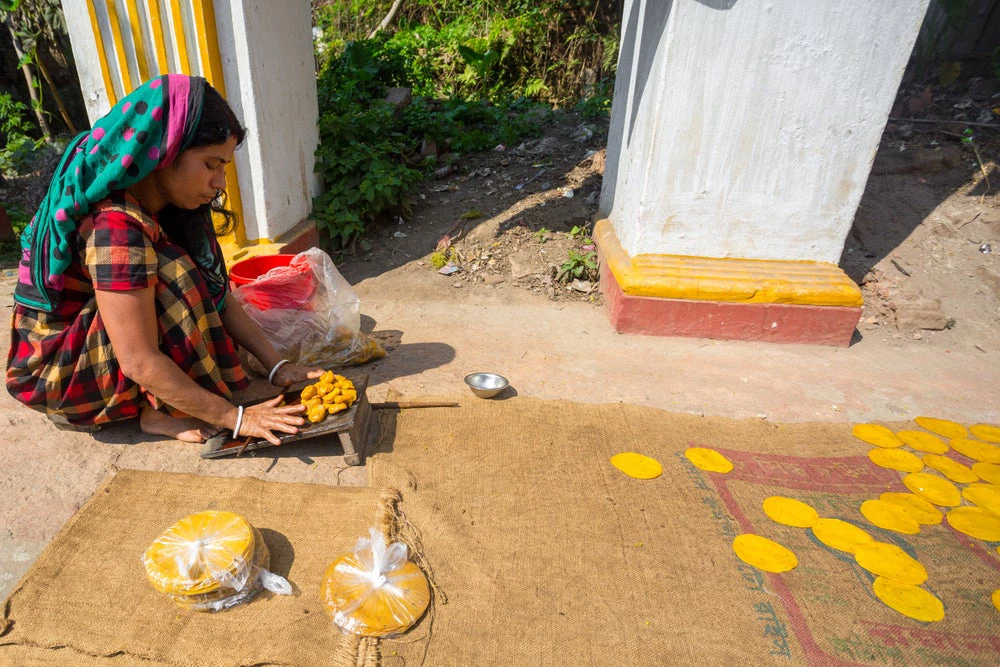 A small business woman making handmade Pappor (deep-fried bread) at Dinajpur Palace, Dinajpur, Bangladesh
A small business woman making handmade Pappor (deep-fried bread) at Dinajpur Palace, Dinajpur, Bangladesh
Business is booming for Chaldal.
The Bangladeshi online grocery supplier delivers over 1,500 orders per day, serves more than 20,000 families across Dhaka, and claims 90 percent of the market share. Between 2016 and 2017 alone, its revenue more than doubled from 180 to 380 million takas.
Given Chaldal’s exponential growth, it’s easy to overlook its humble origins.
The company began as a small enterprise just six years ago, with a team of only five people. Chaldal owes much of its success to investing in innovative practices such as using software to monitor wastage, predict when time-sensitive items will sell, and track deliveries .
Innovation led to growth and attracted investment, including from the International Finance Corporation (IFC), the World Bank’s arm that supports private investments.
Close to 99 percent of non-farm enterprises in Bangladesh are MSMEs. In 2013, they created over 20 million jobs.
MSMEs are crucial to Bangladesh’s financial and economic development. According to our recent World Bank report, close to 99 percent of non-farm enterprises in the country are MSMEs. In 2013, they created over 20 million jobs for Bangladeshi workers.
While bank lending to MSMEs has tripled between 2010 and 2016, the large majority of MSMEs have limited access to formal finance. The gap between the funds they have and what they require to run operations and grow is about $2.8 billion.
At the other end of the spectrum, medium-sized enterprises have been increasingly courted by banks and were able to receive some financing, albeit short-term. This leaves small enterprises behind, altogether.
One alternative for MSMEs to obtain funds is to tap into private capital. However, several challenges affect MSMEs’ ability to raise adequate funding.
Moving forward, policy and institutional reforms in these areas can be the low hanging fruits in improving access to finance for MSMEs in Bangladesh.

First, challenges that begin at the institutional level can be addressed by promoting the use of a unified definition for MSMEs. This would help make policy more targeted.
The establishment of a central coordinating body with an overall strategic vision and harmonized approach to support MSMEs’ growth is needed.
For instance, state-owned institutions that lend money to MSMEs should clarify their long-term goals and mandates and the various subsidized financing schemes be better targeted to maximize impact.
Second, strengthening Bangladesh’s financial infrastructure can make accessing credit easier for MSMEs (in 2018, the Doing Business survey ranked Bangladesh at 159 −out of 190 countries on “access credit”).
The gap between the funds they have and what they require to run operations and grow is about $2.8 billion.
To improve credit information, credit bureaus should be given greater reach and consider all commercial loans, regardless of their value or the originating, when assessing the credit rating of MSMEs.
Third, loans in Bangladesh are secured primarily through property-based collaterals. Expanding the collateral registry to include movable collaterals would help MSMEs access more finance.
Additionally, setting up a small claims courts could improve the settlement of disputes MSMEs may face.
Last, technology can provide innovative ways to make payments that can benefit MSMEs, including by creating a “digital footprint” that can be useful to assess credit worthiness.
But while financial institutions are adopting digital payment systems and mobile financial services, legal and regulatory structures have not followed suit and continue to hamper their widespread use.
Technology can provide innovative ways to make payments that can benefit MSMEs, including by creating a “digital footprint.”
Mobile payment systems, for instance, are restrictive because regulations only allow for a bank-led model.
Moving towards digitization of the economy (digital identification, internet connectivity, infrastructure, etc.) would help create an ecosystem that can more effectively gain from the advantages of fintech in the provision of a range of (digital) financial services.
Granted, not all of Bangladesh’s MSMEs can achieve Chaldal’s success.
These recommendations were discussed with main government stakeholders and the private sector in Bangladesh during an exchange event with the Malaysia SME Corp. and WBG in May 2019.



Join the Conversation